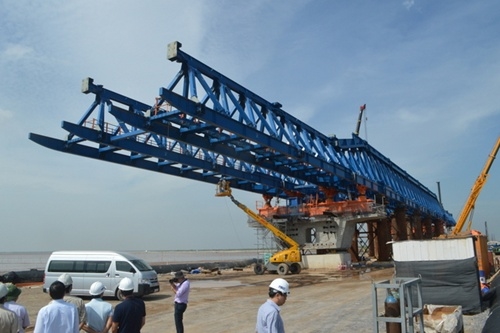 Economy
Economy

After equitisation and restructuring, dozens of firms are considered sufficiently capable to contract for projects funded by overseas aid
 |
| Workers carry out construction work on Tân Vũ-Lạch Huyện Road in the northern Hải Phong City. Built with Japanese ODA, the 15km road will connect with the current national highway that run between Hà Nội, Quảng Ninh and Hải Phòng. — VNA/VNS Photo Huy Hùng |
HÀ NỘI — Enterprises in the transport sector have become more eligible for official development assistance (ODA) after being restructured, officials say.
Many international organisations, including the World Bank (WB), Asian Development Bank (ADB) and Japan International Cooperation Agency (JICA), alongside sponsors from France, South Korea and China, have been funding traffic infrastructure projects in Việt Nam.
However, strict requirements by the sponsors, related to financial capacity and experience, left hardly any chance for the participation of State-run companies in ODA-funded projects in the past.
For example, the WB did not let State utility companies bid for its projects, enabling only foreign companies to become its major contractors.
According to Nguyễn Đức Kiên, General Director of the infrastructure development Thăng Long Corporation, “domestic companies usually had to work as sub-contractors for foreign firms, being put at many disadvantages.”
The sitution is different now.
Vũ Anh Minh, Director of the Ministry of Transport’s Enterprise Development Department, said numerous firms have been equitised and State capital has been withdrawn from many other businesses in the sector over the past two years.
With the reorganisation, they are now capable enough to contract for major projects with ODA capital, either independently or jointly with international contractors, he said.
Minh said the ministry would accelerate equitisation of transport corporations this year. It planned to complete capital withdrawal from several firms, including Cienco 5, Cienco 6 and Cienco 8 in 2016.
"The sooner enterprises get off ‘their parents’ nourishment’, the more experience and resources they will gain to better adapt to market developments," he said. "This is especially meaningful when we are integrated more deeply into the global economy."
Between 2011 and 2015, 137 businesses in the transport sector went public, 67 more than the target that the ministry set for the period, according to ministry’s data.
Việt Nam Expressway Corporation General Director Mai Tuấn Anh said any domestic enterprises could now participate in ODA-funded projects provided they prove adequate financial capability and experience.
The company strictly selected contractors using international competitive bidding procedures, he said.
According to Anh, JICA financed a part of the Đà Nẵng-Quảng Ngãi highway in the centre of the country, with Vietnamese enterprises executing seven of eight construction packages, while a joint venture between Việt Nam and Spain was responsible for the rest of the project.
With regard to three packages funded by JICA in the Bến Lức-Long Thành highway project in the south, Vietnamese and Japanese enterprises jointly became contractors.
Nguyễn Tuấn Huỳnh, Chairman of Civil Engineering Construction Corporation No 4 (Cienco 4), said the State-run firm transformation into a joint stock company in mid-2014 was a landmark for its development.
This created better conditions for it to expand markets and approach large-scale projects funded by WB, ADB and JICA. Two of the projects were the Nội Bài-Lào Cai highway in the north and the Nhật Tân bridge in Hà Nội.
Kiên from Thăng Long Corporation said his firm would promote cooperation with foreign contractors to better respond to opportunities of ODA projects.
Huỳnh said Cienco 4 was actively renewing management methods, rationalising organisational structure and enhancing operational efficiency. It now would focus on improving technology, financial capacity and human resource quality to stay competitive for ODA project requirements.
According to the public-private partnership project management board under the transport ministry it is important to develop cadres for equitised businesses. Besides capital and equipment, human resources are reportedly of the most decisive factors in determining tender winners. — VNS




